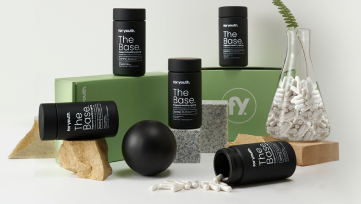Boost Your NAD: Unlocking The Secrets Of Longevity


 Shop our NMN
Shop our NMN 
The pursuit of longevity has long been a topic of interest for scientists and the general public alike. With advancements in medical research, the idea of living a longer, healthier life has become a realistic possibility.
One promising avenue for achieving this goal is through boosting levels of nicotinamide adenine dinucleotide (NAD), a molecule that plays a crucial role in many biological processes. NAD is involved in cellular energy production, DNA repair, and gene expression regulation. It is also a key player in the body’s defense against aging and age-related diseases.
While NAD levels naturally decline with age, recent studies have shown that boosting NAD levels through various methods, such as fasting, exercise, and certain foods, may slow down the aging process and reduce the risk of age-related diseases.
In this article, we will delve into the science behind NAD and explore ways to unlock the secrets of longevity by boosting NAD levels.
By signing up, you consent to receive For Youth emails
Get The Latest On Longevity Delivered To Your Inbox.
Key Takeaways

- NAD is important for cellular energy production, DNA repair, and gene expression regulation.
- NAD levels decline naturally with age but can be boosted through fasting, low caloric state, NAD boosters, high-intensity exercise, and certain foods such as vitamin B3, NR, NMN, and resveratrol.
- A balanced diet, exercise, and lifestyle factors can contribute to overall health and slow aging.
- NAD-based therapies could potentially treat cancer, Alzheimer’s disease, and type 2 diabetes, and ongoing research into NAD is expected to reveal more about its role in aging and disease.
Ways to Boost NAD
Various methods such as fasting, low caloric state, NAD boosters, high-intensity exercise, and consumption of certain foods have been suggested to boost NAD levels.
Fasting has been shown to activate genes that promote NAD production, while a low caloric state can increase NAD levels.
NAD boosters, such as NR and NMN, can mimic the effects of fasting and upregulate sirtuin activity, a group of longevity-associated proteins that are involved in various cellular processes.
In addition, high-intensity exercise can boost NAD levels and activate longevity genes.
Physical stress from exercise can also trigger repair genes, which can help improve overall health.
Foods that are high in vitamin B3, NR, NMN, and Resveratrol, such as oily fish, whole grains, and green vegetables, have been found to indirectly boost NAD levels.
However, it should be noted that the doses used in studies are thousands of times higher than what can be achieved from food, making it unrealistic to rely solely on food intake to boost NAD levels.
Foods that Help

 Shop our NMN
Shop our NMN 
Foods that are high in vitamin B3, NR, NMN, and Resveratrol have been identified as potential contributors to an increase in NAD levels.
Vitamin B3 is found in foods such as poultry, fish, beef, peanuts, and mushrooms. NR and NMN are two types of molecules that can be found in small amounts in some foods, including milk and vegetables. While these nutrients can help boost NAD levels, it is important to note that the doses used in studies are thousands of times higher than what can be achieved from food alone.
Consuming a well-balanced diet that includes foods high in these nutrients can support overall health and potentially contribute to NAD production.
Resveratrol, a compound found in deep red or purple fruits and vegetables, has also been identified as a potential NAD booster. Foods such as grapes, blueberries, and peanuts are rich in resveratrol. However, like other NAD-boosting nutrients, the doses used in studies are much higher than what can be achieved through food alone.
While consuming these foods can support overall health, it is unrealistic to rely solely on them for NAD production. As research into NAD boosting continues, it is important to remember that a balanced diet, exercise, and other lifestyle factors can all contribute to overall health and potentially slow the aging process.
Potential Risks and Precautions
It is important to consider potential risks and precautions before making significant lifestyle changes to increase NAD levels. While research into NAD boosters is new and lacks large-scale or long-term studies in humans, no major safety concerns have been found in studies so far. However, caution and physician consultation are still recommended before embarking on any significant lifestyle changes.
It is also important to note that while NAD boosting may reduce the burden of age-related diseases by slowing aging, there is currently no evidence that NAD boosting supplements are effective in promoting overall health. Eating more fruits and vegetables, which are high in vitamin B3, NR, NMN, and Resveratrol, may indirectly boost NAD levels and is recommended for overall health.
As more evidence is expected in the future, it is necessary to approach NAD boosting with caution and consult with a physician before making significant lifestyle changes.
Future of NAD Research
Ongoing research into the mechanisms and potential benefits of NAD boosting is expected to shed further light on its role in aging and age-related diseases. As scientists continue to investigate the effects of NAD on cellular metabolism and gene expression, they hope to discover new ways to delay or even reverse the aging process.
Some of the areas of NAD research that are currently being explored include:
1) Identifying new NAD boosters: Researchers are searching for new compounds that can increase NAD levels and activate sirtuins, which are enzymes that play a role in regulating metabolism and gene expression. Some of the compounds that are being studied include nicotinamide riboside (NR), nicotinamide mononucleotide (NMN), and apigenin.
2) Understanding the effects of NAD on cellular processes: Scientists are investigating how NAD affects cellular processes such as DNA repair, inflammation, and energy metabolism. By understanding these mechanisms, they hope to develop new treatments for age-related diseases such as cancer, Alzheimer’s, and diabetes.
3) Developing new NAD-based therapies: Researchers are exploring the potential of NAD-based therapies for treating a wide range of diseases. For example, NAD-based therapies could be used to boost immune function in cancer patients, improve cognitive function in people with Alzheimer’s disease, or increase insulin sensitivity in people with type 2 diabetes. As research in this area continues, we will likely see new NAD-based therapies being developed and tested in clinical trials.
FAQ:
Are there any natural supplements that can boost NAD levels?
There is some evidence to suggest that certain foods high in vitamin B3, NR, NMN, and Resveratrol can indirectly boost NAD levels. However, doses used in studies are much higher than what can be achieved from food alone, and there is no strong evidence for the effectiveness of NAD-boosting supplements on health.
Can boosting NAD levels help with weight loss?
There is no evidence to suggest that boosting NAD levels can directly lead to weight loss. However, certain lifestyle changes, such as fasting and exercise, that can increase NAD levels may indirectly support weight management. Further research is needed to explore this relationship.
How long does it take to see results from NAD-boosting methods?
The timeline for seeing results from NAD boosting methods is not well-established due to the lack of large-scale or long-term studies in humans. Caution and physician consultation are recommended before significant lifestyle changes.
Are there any negative side effects associated with NAD boosters?
Limited studies suggest no major safety concerns with NAD boosters, but caution and physician consultation are recommended before significant lifestyle changes. More research is needed to fully understand potential negative side effects.
Can NAD boosting help with specific health conditions, such as diabetes or cancer?
Current evidence does not support the effectiveness of NAD boosting on specific health conditions such as diabetes or cancer. Further research is needed to understand the potential benefits and risks of NAD boosters in disease prevention and treatment.
Conclusion
In conclusion, boosting NAD levels is a promising approach to slowing down the aging process and reducing the risk of age-related diseases. Research has shown that fasting, exercise, and certain foods can help increase NAD levels in the body. However, it is important to note that more research is needed to fully understand the effectiveness and safety of NAD boosters.
While the potential benefits of NAD are exciting, there are also potential risks and precautions to consider. It is important to consult with a healthcare professional before starting any NAD-boosting regimen.
Despite these uncertainties, the future of NAD research is promising and may hold the key to unlocking the secrets of longevity. Continued research in this area may lead to innovative approaches for enhancing human health and extending lifespan.








